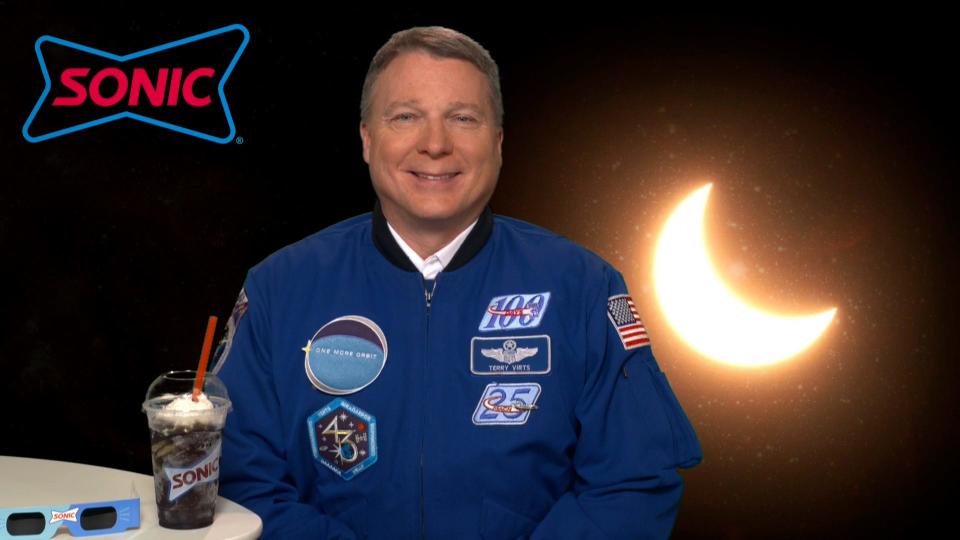'Unlike anything' else: A NASA scientist describes seeing a solar eclipse from outer space
Ever wondered what it is like see the solar eclipse from space? Hear it from former NASA scientist and veteran astronaut Terry Virts, who has witnessed the spectacle in space.
"When I was in space in 2015, we saw an eclipse over the North Atlantic," Virts told USA TODAY this week. "It was an eclipse that very few humans saw I think, but it was a really unique experience to look down and just see this big black circle kind of moving across the planet."
"It was unlike anything I've ever seen," Virts adds. "I joke I'm glad they told us there was an eclipse because it would have been unsettling to look down at Earth and see this black spot moving across. It was really cool."
What to know: Solar eclipse a little over a week away
Virts, who is the face of Sonic's eclipse-themed Blackout Slush Float, said that though he's seen one eclipse from space and many from Earth, he is super excited about the upcoming one on April 8.
"I say on a scale from one to 10, that's kind of like a seven," Virts says of the upcoming eclipse. "It's interesting. It gets a little bit dark. If you have proper eclipse viewing glasses, which you can get (for free) at Sonic, you can see the moon take a bite out of the sun."

An eclipse-themed treat: Sonic's new Blackout Slush Float is now available
Exercise precaution while seeing the eclipse
However, Virts advised everyone to be careful while viewing the eclipse and avoid staring at the sun with unprotected eyes or even with normal sunglasses "because the sun is just so bright."
"It's bad. It's bad for your vision," Virts said. "So please don't do that unless you have a pair of safe, eclipse viewing glasses."
'Not going to happen again for 40 years'
Virts also encouraged everyone to make the effort and get to the path of totality to see the solar eclipse because "it's an amazing experience and it's not going to happen again for 20 years in America."
"A total eclipse is like a million on a scale from one to 10," Virt said. "I got to see that in 2017 in Oregon. And it was completely amazing. I've never experienced anything like that."
Virts, himself, is planning to catch the upcoming solar eclipse in the Dallas-Fort Worth area, which is close to the center of the path of totality.

What to expect on April 8, 2024: What happens during a total solar eclipse?
Search your ZIP code for a viewing guide What time is the total solar eclipse on April 8?
On what makes the upcoming eclipse special, Virts said that besides the fact that such a spectacle won't happen again for 20 years, it is that viewers will get a really long period of totality.
"The moon is going to be perfectly centered over the over the sun," Virts said. "It's really going to black out completely. If you're in the middle of the path of totality, you can get up to four and a half minutes, which is a lot."
"If you're on the edges of that band, you may only get a few seconds," he said, encouraging people to go as close as they can towards the middle of that band to see it.
The NASA scientist also encouraged eclipse viewers to observe their surroundings during the event.
"Look down and just look around you," Virts said. "You know look at the horizon. You'll see sunset and all dirt on all directions which is pretty amazing. See how wildlife and nature is reacting to it. I think it's interesting not only to look up but also to look down."
Virts, who retired from NASA in 2016 after a 16-year career, spent almost 231 days in space. His most memorable experience from then? The Northern Lights!
"I think one of the coolest things that I've seen [from space are] the Northern Lights and the Southern Lights," Virts said. "I still haven't seen them from Earth, I've only seen them from above. They are out worldly. Just spectacular."
"They're also they are from the sun (like the eclipse)," explained Virts. "It's radiation from the sun. These particles explode, they shoot out in the space and that's what causes the Northern and Southern lights. They're really amazing to see from the space station."
Saman Shafiq is a trending news reporter for USA TODAY. Reach her at [email protected] and follow her on X, the platform formerly known as Twitter @saman_shafiq7.
This article originally appeared on USA TODAY: What does the solar eclipse look like from space?
